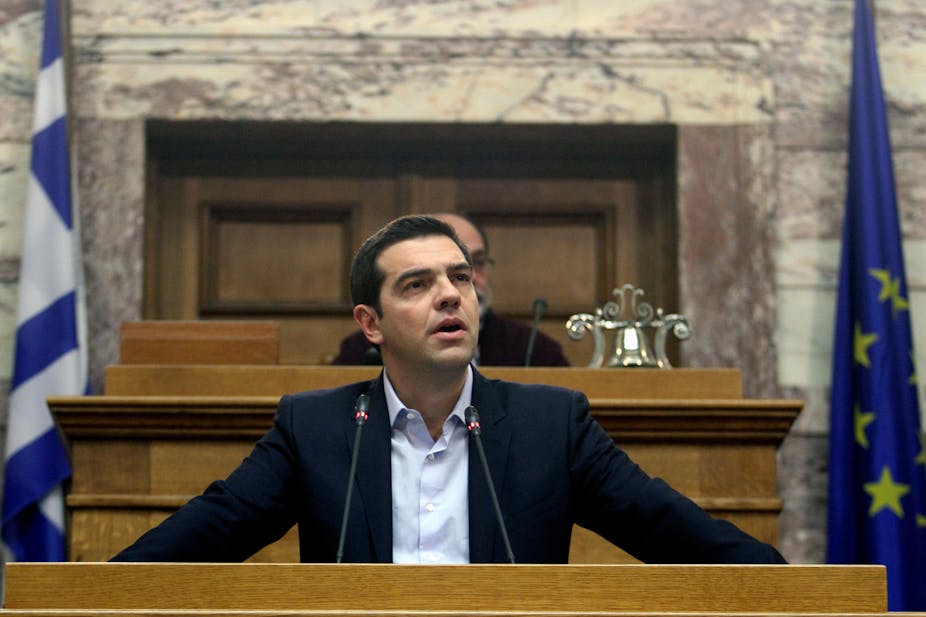The world breathed a sigh of relief when Greece accepted a four-month extension to its current bailout programme on February 20. After much political rhetoric to the contrary, newly-elected Syriza promised to continue with reforms. The deal is such that the vital last injection of cash that is propping up its economy – worth €7.2 billion – will only be delivered when these reforms are in action.
In fact, the deal requires not only that the old reforms of previous bailout programmes continue, but that new ones are implemented. They are squarely aimed at making the Greek economy more productive. But agreeing to these reforms required Syriza to go against its mandate of ending austerity. For this reason we cannot rest assured that the path to economic reform will be plain sailing.
Reforms, reforms, reforms
The old programme – called “mnimonio” or MoU – achieved what it was supposed to accomplish: unprecedented fiscal consolidation, international trade surpluses and some economic growth, much earlier than the programme forecasted. But more is needed. Greece is a rich and wealthy country with untapped potential but this can only be realised if drastic structural changes are implemented.
The new agreement maintains and asks for the same type of reforms as the previous ones. They can be summarised under four headings:
- Austerity measures to balance the country’s balance sheets.
- Financial stability of the Greek banking sector.
- Labour market policies that will create a competitive economy.
- Addressing poverty without spending beyond its means.
Austerity measures
Austerity measures are here to stay and the Greek government is committed to their continuation. By definition, when an economy grows at a rate that is either negative or below 2% and the economic policy authorities are forced to balance the government budget or worse, to generate primary surpluses to pay for the external public debt, then an economy is under strong austerity measures. The new coalition government – formed between Syriza and the far right Independent Greeks – agreed to continue with these because they had no other choice. Ironically the parties are aligned in their opposition to austerity but are dependent on the eurozone’s money to run the country.
Tax evasion
The austerity measures would not be needed if the Greek tax administration were able to restrict ubiquitous tax evasion. Many governments have tried before but failed. Syriza promises success. The best solution to Greece’s tax problem is to tax wealth rather than income and consumption.
Combating tax evasion by chasing those who do not report their income or do not pay their value added tax is a costly endeavour. The administration cost of doing so could even be higher than the tax revenue collected. In any case, tax evasion cannot give immediate results and the Greek government needs money to pay its bills right away. The alternative is bankruptcy.
Minimum wages and labour policies
Syriza promised that the day after the election the minimum wage would increase to its pre-crisis level of €751 per month. The new agreement puts this promise on hold. This should have a positive effect on the economy, which cannot afford the increased outgoings.
Privatisation
Privatisation and foreign direct investment will drive the economy out of the current recession. Despite its unrealistic pre-election promises, the government now promises to continue with the privatisation programme. If implemented, this will create well-paid jobs and the Greek economy will grow.
Poverty alleviation
As with all eurozone countries, Germany included, Greece suffers from an increasing number of people under the poverty line. Syriza likes to call it a humanitarian crisis. But if this is the case, then many other European countries, including some of the eurozone group, are suffering from this crisis too. If there is a humanitarian crisis in Greece, this cannot be the result of the recent recession but of unequal distribution of income and wealth. Even after the recent economic crash, Greece produces sufficient income and has accumulated enough wealth to be able to cope with poverty alleviation.

Few doubt that the new deal is worse than the previous agreement because the Greek economy lost the momentum it had before an election became imminent. Since the election call of January 25, all economic indicators revised downward. Given the circumstances of Syriza’s attempts to rewrite the country’s debt, it is the best Greece could have achieved.
Internal opposition
Overall the new agreement is a good deal for Greece’s economy. But Syriza was elected on a different mandate. They wanted to abolish the mnemonio with one act of parliament and write off most to the Greek debt. The new agreement is neither of the two.
Since the new agreement is actually a continuation of the previous one, it has the full support of the opposition parties that governed Greece over the last five years. The agreement does not, however, have the full support of Syriza’s party members or voters.
In a recent crucial meeting of Syriza’s central committee, 45% of members voted against the new agreement. This might explain why more and more people are talking either of new elections or of a referendum. A new election, as the recent one, would risk economic turmoil and potentially put Greece back on a collision course with the eurozone.

